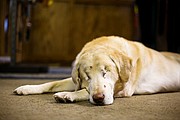Eyeless dog a happy sight
Devin Heilman | Hagadone News Network | UPDATED 12 years, 5 months AGO
HAYDEN - Moose is blind.
Not just blind. He has no eyes.
The 14-year-old yellow lab had to have them surgically removed to save his life about five years ago, when he suffered a bad reaction to anesthesia following what was supposed to be a minor surgery. The eyes began collapsing in the sockets, first one, then the other, causing pain and blindness.
His owner, Jim Self, had no choice.
"It should have never been a surgery," he said on Friday afternoon. "I feel responsible ... had I not told them to do that biopsy on that mole, he would not be blind."
Self said he found a weird lump above Moose's eye, so he brought him in for inspection. The mole was removed, and Self said it took Moose a few days to shake off the anesthesia. When he finally did, his behavior was off; he was bumping into things. Self became concerned, so he took Moose to see his usual vet.
"They said, 'He's blind, Jim,'" Self said. "I said, 'What do you mean he's blind?'"
As the eyes degenerated, the options were to have them removed or subject Moose to a costly surgery that may have not even worked. So, Self and his wife, Megan, decided to have them removed.
"I couldn't put my buddy down," he said. "I just couldn't do it."
Self said Moose needed some time to adjust to his lost sight, but eventually recovered.
"He had a couple rough years," he said. "I actually thought I was going to lose him."
It takes a second or maybe third look to figure out that Moose's eyes are gone. It appears they are merely closed. His ears perk when he hears a new voice. He slightly tilts his head, his snout points up into the air and his nose begins instantly quivering, taking in the scents that allow him to know the unidentified human. He'll sniff from the shoes to the knee and then the hands, finally deciding to wag his tail in an approving manner.
"If he was unhappy or he was in pain, it'd be different, but he's not," Self said. "You can tell when a dog's not happy, they don't wag their tails, you know. I mean, he's content."
Self adopted Moose when he was 4 weeks old. Self took him everywhere and they used to be hunting partners.
"He was a fantastic duck dog, and goose dog, and I used him for pheasant after he went blind for a little while because his nose is fantastic," he said.
Self said Moose also loved to play soccer.
"Before he went blind, this dog could play soccer like a pro," Self said. "We had a soccer ball. He would go through a couple a month, and he'd play with the grandkids and my boy in the backyard and this dog literally could field the ball. He would grab it with his chest and his chin, and he would field and play that ball all the way down to the goal. I'd never seen a dog do anything like that."
Moose still goes everywhere with Self. He gets up with him at 6:30 every morning and they run errands. Then Self brings Moose to work at his gunsmithing shop, where customers love him.
Self bent down and scratched behind Moose's ears and gave him an ample pat. Moose tilted his head toward Self, his tail wagging as he gave his human a big dog smile.
"He's not really a dog," he said. "He's kind of like a person in a dog's body. He's a cool dog."
Self said Moose is very spoiled. He cuddles with Megan when she reads in bed, and hangs out and enjoys TV with their teenage son. Self has asked veterinarians if the blind canine really has a high quality of life, and he said their response was "definitely yes." At his recent senior checkup, he was as healthy as a 14-year-old dog could be: good heart, good teeth, some hip degeneration. But overall, he's doing quite well.
Having a blind dog has had its challenges. Self said Moose is on a strict feeding and vitamin schedule, and requires constant attention. But the interaction between Self and his dog show that it has been worth it.
"You only get one of these in your life," he said.
ARTICLES BY DEVIN HEILMAN

3Cs will again donate $100,000 to nonprofits
COEUR d'ALENE — It's been another big year for the women of Cancer and Community Charities.

Michael Harrison: A passion for performing, a heart for teaching
IN PERSON
Coeur d'Alene Charter Academy instrumental music instructor Michael Harrison plays at least 14 different musical instruments.

Peace and Justice Vigil attendees mourn victims of Orlando shooting
COEUR d'ALENE — Long-stemmed carnations of red, white, pink and yellow were placed on a table under the rainbow arch in McEuen Park.



